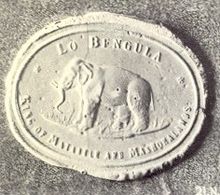Matabele Kingdom
The Matabele Kingdom was an African state that existed from 1837 to 1893, territorially almost the same as today's Zimbabwe .
The Matabele or Ndebele Kingdom was founded in 1837 by the renegade Zulu leader Mzilikazi , who fell out with the Zulu King Shaka in 1823 and left the Zulu Empire in what is now the South African province of KwaZulu-Natal with numerous supporters . The name Matabele was given to them by the neighboring Bantu people of the Tswana , after they had first settled in the area around what would later become Pretoria . From 1834 they moved on to what is now Zimbabwe. After the subjugation of the local Shona people , Mzilikazi became the first king of the Matabel area in 1837. The capital was Bulawayo , 75 kilometers west of Dhlodhlo , the residence of the subject Changamire state. In the 1860s the northern part of the Schona area was also subjugated. Thus, the empire encompassed the entire national territory of today's Zimbabwe except its east, the Manicaland .
Under Mzilikazi's energetic leadership, the state, like the Zulu Empire, was an expansive military despotism that rapidly expanded at the expense of the peaceful neighboring peoples. The standing army of several thousand men was structured according to regiments ( Impi ) , as in the Zulu Empire , led by a noble caste ( InDuna ).
Migration and the way in which the state was established were typical events of the Mfecane of the 1820s and 1830s.
When Mzilikazi died in 1868, his son Lobengula succeeded him to the throne. In contrast to his father, the peace-loving Lobengula did not pursue a warlike policy. During his reign, the capital Bulawayo became an important trading hub in southern Africa.
After the fall of the Zulu Empire in 1879, the Matabele Kingdom was the only remaining sovereign Black African kingdom alongside the Abyssinian Empire . In 1893 British colonial troops invaded the country from the south. They used the Maxim machine gun for the first time . The British did not respond to King Lobengula's offers to negotiate. The matabele were beaten. Bulawayo fell in November 1893. The 60-year-old king managed to escape from the burning capital, but he was no longer able to cope with the hardships and died on the run on January 23, 1894. The Matabel area was administered after the suppression of the Matabel rebellion in 1896 by the British South Africa Company .
Note on the text of the seal
Since English and Arabic have only one unflexed article, the "classes" common in many African languages are regarded as prefixes. From the German point of view, they can also be viewed as inflected articles , as the text layout of this seal depicts: “Lo Bengula”. The Schona ( Ma Shona) speak the Schona ( Chi Shona); the child is mu ana, the child is v ana.
See also
literature
- Williams, Chancellor: The Destruction of Black Civilization. Kendall / Hunt, Dubuque 1971.


